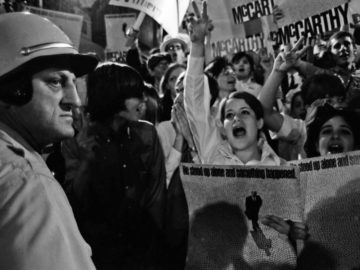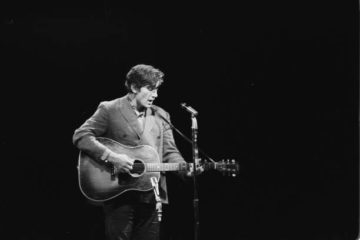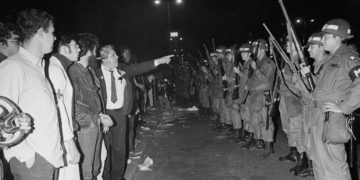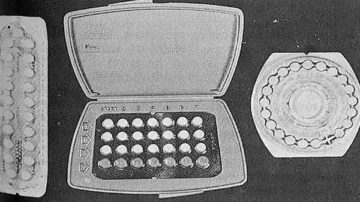by Carol A Westbrook
Oh, where were you in Chicago?
You know I didn’t see you there
I didn’t see them crack your head
Or breathe the tear gas air
Oh, where were you in Chicago
When the fight was being fought?
Oh, where were you in Chicago?
‘Cause I was in DetroitWhere were you in Chicago? —Written and performed by Phil Ochs.
 When I heard that Chicago will host the 2024 Democratic National Convention next August, (August 19-22,) it brought back a flood of memories. Memories, not only of the convention itself, but of the 60’s. “The 60’s” did not exactly span the decade but began in 1963 , when John F Kennedy was shot, and ended in 1975, when the war in Vietnam ended. During this relatively short period, our country went through a large number of societal changes, including political changes, changes in gender stereotypes, in racial interactions, in acceptable speech, in sexual mores. This was the time when we Baby Boomers came of age, when the 76 million Americans born between 1946 and 1954, began to flex their muscles and recognize how much they could accomplish, and what a loud voice they had when acting as a group. For example, they influenced clothing styles and music. They had tremendous purchasing power, as most of the clothing for sale after the 60’s was more appropriate for a-19–year-old than for a 40 or 50- year old American!
When I heard that Chicago will host the 2024 Democratic National Convention next August, (August 19-22,) it brought back a flood of memories. Memories, not only of the convention itself, but of the 60’s. “The 60’s” did not exactly span the decade but began in 1963 , when John F Kennedy was shot, and ended in 1975, when the war in Vietnam ended. During this relatively short period, our country went through a large number of societal changes, including political changes, changes in gender stereotypes, in racial interactions, in acceptable speech, in sexual mores. This was the time when we Baby Boomers came of age, when the 76 million Americans born between 1946 and 1954, began to flex their muscles and recognize how much they could accomplish, and what a loud voice they had when acting as a group. For example, they influenced clothing styles and music. They had tremendous purchasing power, as most of the clothing for sale after the 60’s was more appropriate for a-19–year-old than for a 40 or 50- year old American!
I am a Boomer, and I turned 18 in 1968. High school graduation was behind me, and I was looking forward to college in October at University of Chicago. The summer was fun.
I had a part-time job in an office, so the hours were short and I had plenty of time to go to the beach or to socialize in the long, hot summer evenings of the Midwest. My boyfriend, Greg, enjoyed driving, so he took me around the city a lot. I had a good friend who was volunteering for McGovern’ campaign. We Boomers supported McGovern because he was anti-war– which seemed to be the most important quality a candidate needed to get this the votes of our large block. Although quite frankly I was always more interested in feminist issues.
My friend, Terry, who worked in McGovern’s campaign headquarters, invited me to join him and help out distributing the flyers and doing some secretarial work. My folks forbid me to do this since I might get hurt, as tempers were short and the anti-war and pro-war offices were both downtown in the same building! For the same reason I expected them to forbid me to join the convention protests—which, of course, they did. They had read in the papers, and heard in downtown gossip, that violence was going to break out in the convention, due to the intervention of the Chicago Police Department (CPD). Of course I minded my folks, even though I was 18, I was living at home, and they were providing food and shelter, and not to mention paying for college tuition. I could do what I wanted when I was in college.
A few days later, after the convention had started, Greg drove me around downtown. As we passed Grant Park, the area outside the Hilton, the main convention hotel, we saw a melee of hippies, students, and other young people, fending off police wielding billy clubs! I was shocked, and grateful I had indeed listened to my parents.

A few months back, Phil Ochs—the singer-songwriter who wrote the song quoted above—agreed to help Abbie Hoffman of the Yippies organize the Festival of Life at the Convention. Ochs was asked because he knew the musicians personally, people like Judy Colline, Grahaam Nash and Stephen Stills: they were asked to perform but they declined for fear of violence. The City of Chicago refused to issue any permits for the festival, and additional musicians withdrew from the project. Phil Ochs and several other singer-songwriters performed during the festival. During his performance of “I Ain’t Marching Anymore,” one of his most acerbic and damning anti-war songs, bursts of fire sparkled throughout the crowd as young men from across America took the song’s message to heart and burned their draft cards. It was a defining moment in Ochs’s life and one of his greatest personal achievements. “This is the highlight of my career,” he told journalist Paul Krassner as he walked off stage. He felt like a Hollywood hero against the Vietnam war in Chicago’s Grant Park, at the Democratic National Convention.

Shortlly after Ochs’s performance, Chicago mayor Richard Daley, dispatched hundreds of police, sparking mass violence and leaving many demonstrators and police severely injured. Since this was to be a 3-day music festival / protest, many people were camping in the park, increasing the crowd size into the evening. The National Guard was called out and the riots continued. In the end, over 500 protestors were injured, and at least as many police officers; one civilian was killed.
Hubert Humphrey, the establishment candidate, won the nomination. Richard Nixon, of the Republican Party, won the election. And Phil Ochs, disillusioned and disappointed with the way National politics was going, with the Vietnam War still continuing he, sunk into a deep depression, and eventually, on April 9, 1976, he took his own life.
During those 6 years after the convention ended, he was still as prolific as ever, releasing several albums and continuing protests in his own way – with music. We invited him to give a performance at the University of Chicago, in 1969. I was with the contingent that picked him up at the airport and drove him to campus, and it was an honor to get to meet him in person!

The 60’s saw the beginning of the sexual revolution. The first oral contraceptive, Enovid, was approved by the FDA on May 9, 1960. However, it was restricted to married women. Single women gained the right to obtain and use birth control in the 1973 Supreme Court decision Eisenstadt v. Baird.
Individual states continued to expand abortion rights throughout the United States. But it wasn’t until January, 1973, that the landmark Supreme Court decision ,Roe v. Wad, that all women were given the right to abortions before 24 weeks, the time at which the baby could survive outside the womb.
With effective oral contraceptives, abortion if needed, and no fear of Herpes and HIV (which did not appear until the 80’s) the stage was set for truly free love. Women found that they could enjoy sex, and books like Gloria Steinhim’s The Feminine Mystique helped develop this concept. In September of 1968, women gathered on the boardwalk of Atlantic City to protest the Miss America Beauty Contest. They threw their bras, girdles and curlers into a “Freedom Trash Can” and would burn their bras (technically this burning did not take place because the wooden planks of the boardwalk were combustible). Nonetheless, the bras were considered burned! Two blocks away, African-Americans, who were underrepresented in the Miss America Contest,
The push for Civil Rights, which culminated in the passage of the Civil Rights Act of 1964, helped increase the status of women and minorities. A wave of feminist activism was born. Feminist activism propelled the movement for women’s rights forward. Title IX is the federal civil rights law in the United States that was enacted as part of the Education Amendments of 1972 (Title IX) prohibits discrimination based on sex in education programs and activities that receive federal financial assistance.
The 60’s were a special time for America. They began in1963, when JFK was shot, ending an era of hopefulness, of promises of peace and love, replacing them by protests and paranoia. Yet there were so many other social changes that came along with the 60’s, that when the era ended we saw a whole new future ahead. Where was I in Chicago? Safe at home with my family.
